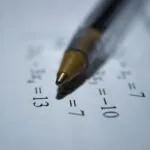
Writing Samples to Help You Practice Proofreading
At Knowadays, we love to help you improve your proofreading skills. So today, we’re giving you three short passages of text to practice on. They are written in American English.
Just copy and paste each passage into a Microsoft Word document and make any changes you feel are necessary (focusing on clear errors rather than style, phrasing, etc., for this exercise). After that, you can compare the changes you made to our suggestions further down the page.
Sample 1: Excerpt from a Blog Post
Dream interpretation is a skill that any one can acquire. It is the art of divining knowledge that is buried in our sub-conscious. It can help us know our selves and solves problems. What more could you ask in a facility that’s freely to your disposal whenever you fell asleep. All you really need is a pen and a paper. Get as relaxed as you can before bed (some book recommend meditation, breathing exercises, or yoga), and then repeat to your self, “I will remember my dreams, and after each dream I will wake up and write them down.” Then, when you wake up, immediately write down your dream. When you come to interpret the dream, look at the events, objects, peoples, colors, and etc., and ask yourself what they do mean to you. This is your own sub-conscious, so your personal interpretation is vial. Once you have done this, you can consult a book or online database of dreams symbols.
Sample 2: Personal Statement
I am a highly driven Manager with over ten years experience. My hands-on approach has led to many significant contract wins. My out standing networking skills have secured several important clients, and my ability to develop professional relationships has resulted in a 22% percent increase in sales for my organization. I employed modernist management methods, tailored to insure maximum productivity. I was also directly involved in the development of strategies that enhanced work flows and reduced redundancy through the organization. I am currently seeking a new challenge that will benefit from my meticulous attention to detail, and and friendly professional manor.
Sample 3: Paragraph from an Essay
In the minds of many scholars and parents, the picture-book has long been soley for children It is well-known that children find images more immediately and naturally accessible than text. As is so often the case, though, it benefits the scholar (and, indeed, the parent) to have a healthy suspicion of so-called “well-known” facts. The statement has an element of truth inasmuch as picture of a tree should in some respects resemble a tree, where as the word “tree” is a purely arbitrary symbol; however, this should not lead us to assume a natural association between the iconic representation and the tree it self. The addressee – the child – must have some concept of the appearance of a tree. He must also understand, to some degree, how pictures work: that he is looking, not at lines and blocks of color, nor at a piece of paper, but at image intended to represent something seperate from the page. There are, therefore, less differences between words and images than one might except.
Edit 1
Dream interpretation is a skill that
any oneanyone can acquire. It is the art of divining knowledge that is buried in oursub-conscious.subconscious. It can help us knowour selves,ourselves andsolvessolve problems. What more could you askinfrom a facility that’s freelytoat your disposal whenever youfellfall asleep.? All you really need is a pen andapaper. Get as relaxed as you can before bed (somebookbooks recommend meditation, breathing exercises, or yoga), and then repeat toyour selfyourself, “I will remember my dreams, and after each dream, I will wake up and write them down.” Then, when you wake up, immediately write down your dream. When you come to interpret the dream, look at the events, objects,peoplespeople, colors,andetc., and ask yourself what theydomean to you. This is your ownsub-conscioussubconscious, so your personal interpretation isvialvital. Once you have done this, you can consult a book or an online database of dream symbols.
Some of the errors in this passage suggest that the author’s first language may not be English. In some places, for example, the author has separated single words into two parts (e.g., any one). There are also places where the noun and verb disagree (e.g., some book recommend) and some misused prepositions (e.g., to your disposal). These are common errors among writers who speak English as an additional language.
Edit 2
I am a highly driven
Managermanager with over tenyearsyears’ experience. My hands-on approach has led to many significant contract wins. Myout standingoutstanding networking skills have secured several important clients, and my ability to develop professional relationships has resulted in a 22%percentincrease in sales for my organization. I employedmodernistmodern management methods, tailored toinsureensure maximum productivity. I was also directly involved in the development of strategies that enhancedwork flowsworkflows and reduced redundancythroughthroughout the organization. I am currently seeking a new challenge that will benefit from my meticulous attention to detail,andandfriendly professionalmanormanner.
Here, the author has cited their meticulous attention to detail, but they have also made some noticeable mistakes. These include using insure to mean ensure, redundancy (i.e., using the percent symbol and the word percent together), confusing the words modern (i.e., up to date) and modernist (i.e., related to modernism), a homophone-based error where manor and manner were mixed up, and an unnecessary comma plus repetition of and in the final sentence. Such errors would undermine the author’s message, so they will need to be corrected!
Edit 3
In the minds of many scholars and parents, the
picture-bookpicture book has long beensoleysolely for children. It iswell-knownwell known that children find images more immediately and naturally accessible than text. As is often the case, though, it benefits the scholar (and, indeed, the parent) to have a healthy suspicion of so-called “well-known” facts. The statement has an element of truth inasmuch as the picture of a tree should in some respects resemble a tree,where aswhereas the word “tree” is a purely arbitrary symbol; however, this should not lead us to assume a natural association between the iconic representation and the treeit selfitself. The addressee––– the child – must have some concept of the appearance of a tree. They must also understand, to some degree, how pictures work: that they are looking not at lines and blocks of color, nor at a piece of paper, but at an image intended to represent somethingseperateseparate from the page. There are, therefore,lessfewer differences between words and images than one mightexceptexpect.
This passage misused hyphens in various places. One key issue is the hyphenation of well-known: this is fine when the word precedes the term it is modifying (i.e., “well-known” facts). But this term is not hyphenated otherwise, so we have removed the hyphen when it is used in the sentence starting It is well known that children… in this passage.
Another interesting case is the use of less in place of fewer. This traditional “error” is now so widespread that it is considered acceptable in some situations (e.g., on signs for checkout lines saying 10 items or less). But in formal writing, such as an essay, it would need correcting.
There were also some typos (e.g., misspelling solely as soley; use of a hyphen in place of a parenthetical en dash; the misspelling of separate; the confusion of except and expect). And there were two sentences where articles were missing (e.g., inasmuch as picture and but at image).
Becoming a Proofreader
How did you do? Did your edits match the ones we’ve provided above? Of course, in some cases, there are other changes that could have been made to address the issues in the text: e.g., rather than adding an apostrophe after years in ten years experience, we could have rephrased to say ten years of experience. But as long as you identified the problems and made relevant changes, you’ll have done the job required!
For more practice passages and a wealth of information about proofreading, try our Becoming A Proofreader course. With a free trial available, you can start learning today. See how Becoming A Proofreader could help you develop a rewarding career in proofreading!









Join the Conversation
Leave a Comment
Your email address will not be published.